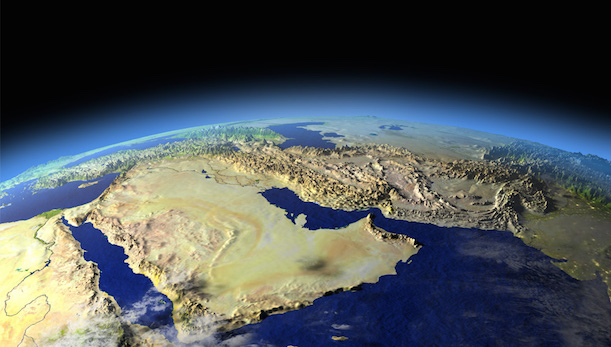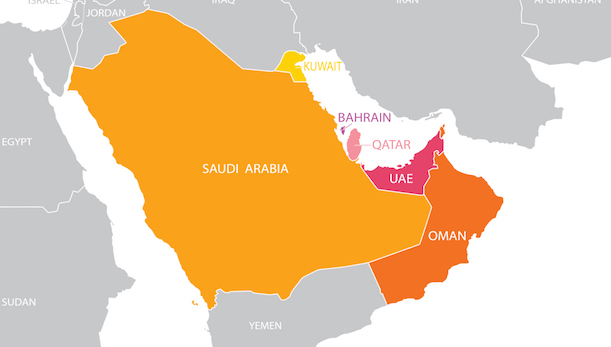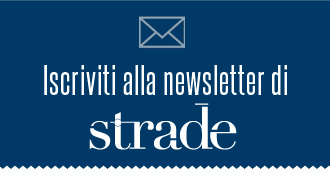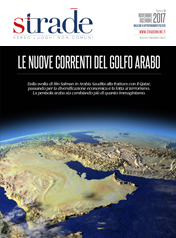New streams in the Arab Gulf
Novembre/Dicembre 2017 / Editoriale
2017 was a crucial year for the Arab Gulf region. Strade's latest monograph looks at what’s changing in the region and questions where such currants could lead.

The last 2017 issue of Strade looks at a particularly rich and intriguing area of the globe, the Arab Gulf. Relations with Iran and Israel, the new balance of power within the Arab Peninsula states, the fracture between the Sunnis and Shiites, the fight against terrorism, the attempt to overcome oil dependence, economic and social reforms: the region is changing and yet very few are aware of this.
In collaboration with the Euro Gulf Information Centre - a think tank based in Rome active since 2015 - we have chosen to describe the Gulf mainly through the voice of regional authors, Arab authors, accompanied by the voices of Western experts and analysts. We find it extremely interesting to read about the change that is happening in the Gulf through the words of those who live there and somehow produce it directly, even when they perceive the inevitable conditioning of their personal point of view. It is a way, as far as we are concerned, to break down barriers and create new "routes" (“strade” in Italian) for dialogue, collaboration and mutual understanding.
In this issue we pay particular reverence to the contribution of a member of the Bahrain government, Undersecretary of Foreign Affairs Abdulla Bin Ahmed Al Khalifa. This will also allow us to make the initiatives of our magazine known in the region (some copies of the English language articles in this monograph will be distributed in Bahrain). Two female analysts, Basma El-Etreby and Yara Ahmed, from the Future for Advanced Research and Studies (FARAS), an Abu Dhabi-based think tank, are authors. Other pieces come from experienced Arab and Western analysts in Europe and America. In the quest for contributions and authors we have realized just how much research centers, think tanks and independent groups are growing and strengthening in the Gulf countries.
The Gulf society is becoming increasingly lively, even within and around the royal families that rule it. It's a slow change, but much more robust than we used to think. The largest and most influential country in the region, Saudi Arabia, is at the center of this change. If the abolition of the driving ban for women does not seem important to you, think what the granting of non-Muslim tourist visas (and perhaps sharia-free tourist resorts on Saudi soil) could mean or the privatization plan that would allow foreign capital to enter into the main assets of the Kingdom, as for example, the sale of a stake in Aramco, the state-owned oil company (or better, family-owned company).
What is happening in the Saudi kingdom, thanks to the emergence of the new leadership of the heir prince Mohamed bin Salman, is accelerating and enlivening the reality of neighboring states, from the Arab Emirates to Bahrain, from Oman to Kuwait. The shadow areas mentioned in the monograph instead relate to relations with Qatar and the situation in Yemen, the failed state of the Arab peninsula (also the only one with scarce natural resources). In his article, Mitchell Belfer - chair of the Euro Gulf Information Centre - explains how and why the (not unexpected) "outbreak" of the significant diplomatic crisis between Qatar and its former allies occurred, a crisis that also leads to Tehran and Damascus.
With this issue, we make a big bet. We bet that 2017 will be remembered as a watershed for the Arabian Gulf, the year that generated a new era of modernization for the region. Will we win or lose this bet? It’s soon to know, we are certainly aware of what Italian and European politics should do in focusing their attention on the countries in the area, the only ones seriously capable of initiating a process of stabilization North Africa and the Middle East. And - hear, hear - perhaps it is also becoming a region where a cultural and religious modernization will take place, something which the Islamic world greatly needs.

INDICE Novembre/dicembre 2017
Editoriale
Monografica
- Golfo Arabo, l’anno che non c’era: cosa, come e perché della crisi del Qatar
- Arabia Saudita, primi importanti passi verso il cambiamento
- Generare forza attraverso l’unità: l’esempio del Bahrein
- Separare la politica dalla religione: un anno di riforme in Bahrein
- Emirati Arabi Uniti, un 2017 in crescita
- Kuwait e Oman, i mediatori del Golfo
- Gulf Economic Visions: come riprogettare l’economia del Golfo
- Arab Gulf, the year that wasn’t: the who, what and why of the Qatar crisis
- Saudi Arabia, the first important step towards change
- Generating strength through unity: the example of Bahrain
- Separating politics from religion: a year of reforms in Bahrain
- United Arab Emirates, a 2017 of growth
- Kuwait and Oman, mediators of the Gulf
- Gulf Economic Visions: how to redesign the Arab Gulf economy









